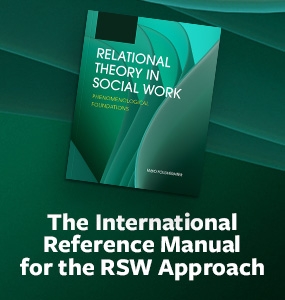Relational Social Work
Erickson
Vol. 4, n. 1, April 2020
(pp. 2-3)
Editorial
Fabio Folgheraiter
Catholic University of Milan, Italy
With great pleasure I introduce this new issue of the Relational Social Work Journal. As usual, the issue hosts research papers and reflections based on social work practice. At this time there are not contributes on COVID-19 Health Crisis because the issue was born before the crisis started. We hope to host reflections on social work and strategies to cope with the crises in the next issue of the Journal.
Going back to this, the issue starts with a reflection on parents’ participation in child protection, that is a complex topic both in its theoretical interpretation and for its operational implementation. After a theoretical introduction of the concept of participation, Calcaterra presents the results from a qualitative research on parents’ participation in the life of their children removed from home and living in residential care. Specifically, the viewpoint of child protection social workers regarding the advantages and critical issues of parents’ participation is highlighted. The paper highlights the importance of creating trust relationships between social workers and parents, and of establishing aid processes that open up a space for collaboration with families, even with situations where social workers had to intervene for the protection of the children and young people.
Corradini, Landi and Limongelli propose a paper that highlights how Relational Social Work principles are applied to social work education. Reflecting on their work with social work students and analysing reports written by them at the conclusion of their unconventional practice placement, authors state that group work allows students to experiment in practice the skills necessary to become a relational social worker. At the end of the paper, the usefulness of group-learning methods for undergraduate social work students is discussed. Moreover, it confirms that the Relational Social Work theory offers useful implications for promoting effective group learning.
Sanfelici and Mordeglia describe the development of a comprehensive information system in the context of a pilot project for early child protection interventions with unaccompanied minors. The system has been defined with the extensive input of social workers, applying a participatory approach. The authors show that is possible to construct a user-friendly information system that can improve the understanding of the phenomenon and support the evaluation of the child protection paths devoted to them.
The reflection on social work education and relational approach continues with the first article of the «Voices from practice» section.
Walker reflects on her practice as social work educator. The author questions how her reflection in practice in response to her students is relational, and how her cognitive and emotional responses might also have an impact on them. A further consideration presented in the paper is related to the emotional toil that can exist for the practitioner when reflecting in action. Social workers, particularly those adopting a relationship-based approach, can be emotionally overloaded/overwhelmed, with an impact on the reflective skills and the practice with service users. The paper is a discussion that promotes a dialogue highlighting the complex emotional and relational elements of reflection in action.
At the end Cirillo presents the work of the non-profit organization «relAzioni» in working to promote «educational co-responsibility» among families and schools in a multi-ethnic neighborhood characterized by economic and educational poverty. The study focuses on the methodology of the community social work applied to improving multi-ethnic cohabitation and strengthening relationships and social ties within the school. The paper presents activities carried out with families with children aged between 3 and 10 years. The participatory methods and strategies implemented highlight the importance of collaboration between schools, parents, and community members.
Thank you to all the authors for their commitment, that improves Relational social work studies.
Milan, April 2020




